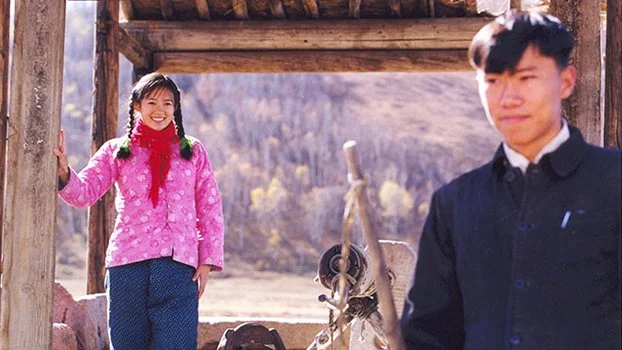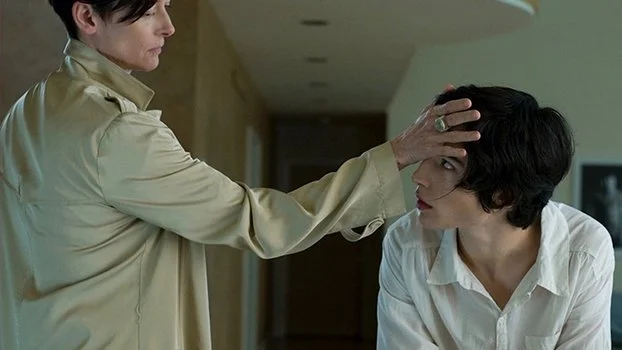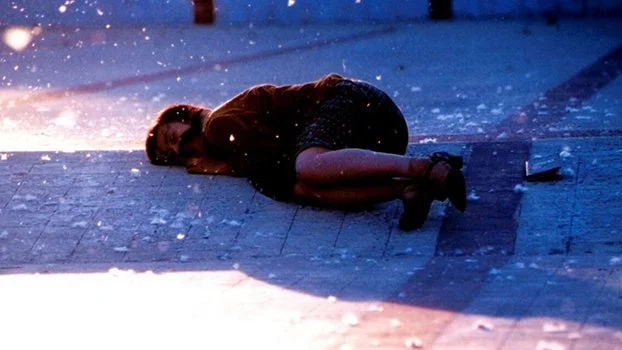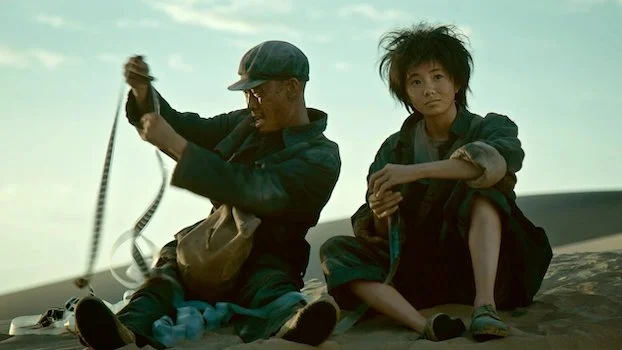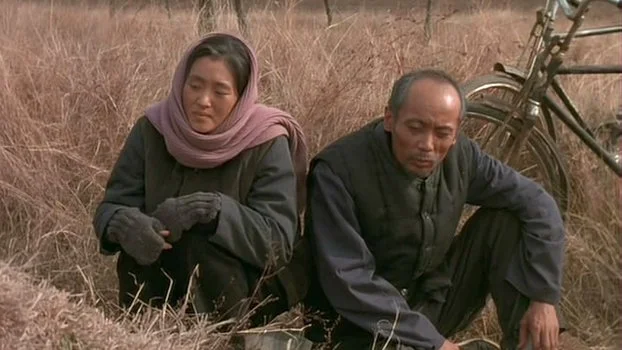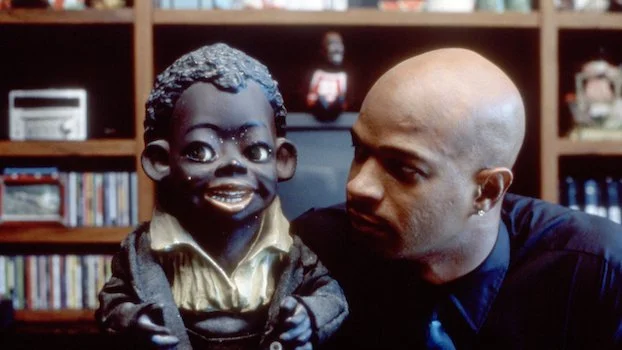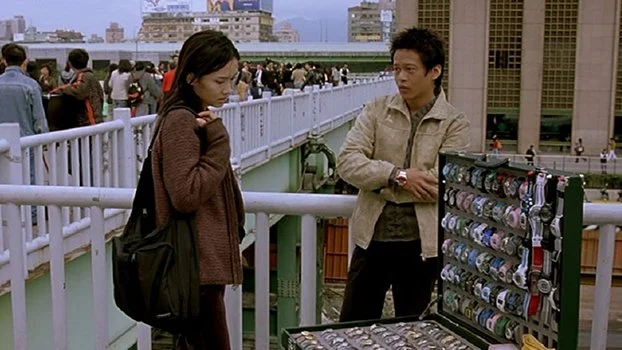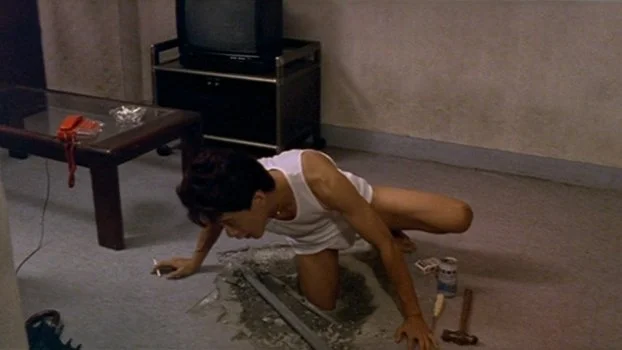The 22 Best Movies I Watched for the First Time in 2022
In 2022 I watched many great movies for the first time, and here are the 22 greatest, RANKED. And these rankings are VERY MEANINGFUL. Anyway, these are all terrific and if one person reads this list and watches one of these movies, I’ll have done my job.
22. No Fear, No Die (1990, Claire Denis)
This French noir about two migrants’ attempts to make it in the world of underground cockfighting is mostly worthwhile as a showcase for two of the most camera-ready faces in movie history, those belonging to Isaach de Bankolé and Alex Descas.
21. Fukuoka (2020, Lu Zhang)
A deceptively low-key relationship movie that probably owes a lot to Sang-Soo Hong and features one of that directors’ favourite actors, Hae-hyo Kwon, in a leading role. The story follows two ex-best-friends who meet up in the titular Japanese city to hash out their old problems. So-Dam Park from Parasite plays a girl who at first seems like a ghost or fantastical embodiment of the guys’ long-lost-love, until she takes on an intriguing life of her own.
20. The Road Home (1999, Yimou Zhang)
Director Yimou Zhang gave us the first films of both Li Gong and Ziyi Zhang… let that sink in. This one is Ziyi Zhang’s debut, and she is magnetic and heartbreaking for every second of this sweet story of young love amidst the Chinese Communist Revolution. Like a few of Yimou Zhang’s films, The Road Home poses a simple, quiet critique of that Revolution’s effect on the everyday lives of regular people. This is not a tragedy, however, but rather a gentle paean to the durability of love and tradition.
19. We Need to Talk About Kevin (2011, Lynne Ramsay)
For long stretches of this film I thought I hated it, but that’s probably only because it’s so effective at selling the frustration and despair of its protagonist (Tilda Swinton), the helpless mother of a natural born psycho (Ezra Miller, whose performance here certainly resonated in 2022). This is one where I would urge you to stick through every unsettling minute until the very, very end.
18. Suzhou River (2000, Ye Lou)
An eerie, noirish romance that lands primarily due to Yu Wang’s textural, atmospheric cinematography and the entrancing quality of lead actress Xun Zhou.
17. Summer Palace (2006, Ye Lou)
Follows the romantic lives of a handful of Chinese young people before and after the massacre at Tiananmen Square, and if you’re surprised to learn that a Chinese movie has that premise, so was I. This film was banned by the Chinese government, but it’s not a simple polemic against authoritarianism; the characters have a complex relationship with China that simply escaping the country doesn’t fix. Ultimately this is about the specific lives of its characters more than any grand historical statement, and the characters live and breathe authentically, especially Lei Hao’s protagonist.
16. I Don’t Want to Sleep Alone (2006, Ming-liang Tsai)
Nobody puts you in a specific place and time like Ming-Liang Tsai. Here the place is Malaysia, where lonely Chinese and South Asian immigrants struggle to make connections in the dreary run-down or abandoned buildings that they call home. Tsai’s cinematic other-half Kang-sheng Lee plays a dual role, the reasoning behind which is strange and intriguing; Shiang-chyi Chen as usual is a source of brightness, and Norman Atun gives a performance of incredible openness and vulnerability as a quiet man whose enormous capacity for love only makes his heartbreak more painful. Typical of Tsai’s films, the locations are as important as the actors, and the world here feels as depthless as the massive underground lake that is the film’s most unforgettable image.
15. Femme Fatale (2002, Brian De Palma)
Seemingly a conscious effort by De Palma to synthesize everything he’s ever done into one movie, this is one of the most watchable entertainments you’ll come across, and significantly rewarding for anyone with even a passing familiarity with the forms and structures of crime thrillers.
14. Green Snake (1993, Hark Tsui)
A Buddhist fantasy action erotic horror adventure, with what looks like a huge budget, starring Maggie Cheung as a snake demon posing as a human seductress. If the previous sentence is not enough to get you to watch this movie, just turn off your computer and go kick a football or something.
13. The Grandmaster (2013, Kar-wai Wong)
Should probably be called, “The Woman Who Fought and Loved the Grandmaster,” since the heart and soul and primary interest of this movie is Ziyi Zhang’s performance. Zhang plays a woman whose fierce devotion to her father’s martial arts tradition is tested by both the Japanese occupation of Manchuria and the merciless passage of time itself. I cannot put this strongly enough: Ziyi Zhang gives an all-time great performance in this movie, by any metric. Her poise and power as the young martial artist is startling, and she conveys the passage into aged deterioration not with makeup or prosthetics but with the subtlest modulation of body language and tone. She is galvanizing and heartbreaking and the reason to see this movie; she’s even more watchable than Philippe Le Sourd’s cinematography, which is saying a lot.
12. Happy Together (1997, Kar-wai Wong)
Melancholy love story about two gay Chinese men trying to make a life for themselves in Argentina. The men are played by icons Leslie Cheung and Tony Leung, and Argentina is shot in impossibly gorgeous colour and black and white by GOAT cinematographer Christopher Doyle, so the film is an unending pleasure to look at despite the story’s often crushing sadness, which contrast is of course Kar-wai Wong’s trademark. I’m not always moved by Wong’s stories of lost love, but I think he nails his particular style here.
11. One Second (2020, Yimou Zhang)
The Yimou Zhang movie that was banned from international festivals, I imagine simply for its fairly mild critique of the Chinese Communist Revolution. I can tell you that this is a masterpiece which you should most definitely watch, but I can’t tell you how to watch it, since I only ever found it as an in-flight movie flying Air Canada, and it wasn’t even available by the time I took my next flight. Anyway, this is Zhang’s “magic of cinema” film – seems every great director is bound to make one of these eventually – but in this case that magic is not come by easily. The meat of the movie concerns the meticulous cleaning of a dirtied 35mm film print, in order to salvage a film screening that is one of the only sources of relief for a small desert outpost at an unspecified point in the revolution. Also circling are an ex-con and a teenaged orphan who each have their own intentions for that film print. Film is a lot of things in this movie: a physical thing that must be handled with care, a shared community experience, a means of government propaganda, a source of very personal relief from said government, and ultimately just a piece of celluloid that can be repurposed to satisfy more basic needs than any of the above. His own dabblings in propaganda aside, Zhang is one of the greatest directors alive, and his musings on his art form are invaluable.
10. The Wayward Cloud (2005, Ming-liang Tsai)
Trigger warning… if you are provoked into a state of caution by the words “trigger warning,” just don’t watch this movie. Plenty of graphic sex even before you get to the long (and I mean long) rape scene which closes this movie, in which the rape victim is portrayed as nothing but a means of metaphorical connection between romantic leads Kang-sheng Lee and Shiang-chyi Chen. How could I defend this movie? Well, it’s just not about designating behaviors as right or wrong; rather, it’s about the deepest loneliness and the strange things humans do to escape it. But avoid if sensitive. Also, it’s a musical.
9. Gabbeh (1996, Mohsen Makhmalbaf)
Just the most visually striking and beautiful movie you’ll ever see.
8. Our Little Sister (2015, Hirokazu Koreeda)
Engrossing family drama with the grace and insight characteristic of Koreeda. Follows three adult sisters who take in their teenaged half-sister after their estranged father passes away. Full of the usual romantic and interpersonal catastrophes, but rendered with the perfect balance of emotion and humour, and surprisingly unsentimental. The best word to describe this movie is “lovely,” with the loveliest and most affecting of all being Haruka Ayase as the oldest sister.
7. To Live (1994, Yimou Zhang)
The best of all Yimou Zhang’s masterpieces, and the one that got him banned from making movies for several years. That might be hard to understand when you watch the movie, because its anger is so indirect it’s almost subliminal. Li Gong and You Ge play a couple who adapt to many hardships amidst the Chinese Communist and Cultural revolutions, and they’re both incredible. Somehow, Li Gong displays extraordinary technical skill while never not seeming guileless. In the list of cinema’s greatest actor-director collaborations, Gong and Zhang should never be left out.
6. Secret Sunshine (2007, Chang-dong Lee)
Painful drama with the spontaneity and complexity of real life. With unthinkable skill, Do-yeon Jeon plays a woman with the rarely-dramatized predicament of having too much grief for one lifetime. Often storytellers make their tragedies comprehendible by way of a life lesson or a proposed source of comfort, but here director Chang-dong Lee faces up to the ungraspable purposelessness of loss. This makes the film sound like cinema’s hugest bummer, but it isn’t. There’s history’s most likable actor, Kang-ho Song, in a supporting role, and there’s the humour and beauty of every-day life that Lee captures honestly and unsentimentally.
5. Bamboozled (2000, Spike Lee)
In a word… wow. About a network producer (Damon Wayans) who recreates early-twentieth-century minstrel shows as a blockbuster TV program. This is a satire in which Spike Lee embodies just about every black stereotype from pop culture and lets these images compete in a race to the bottom. Lee isn’t satisfied to make a simple comparison between the images of late-90s gangsta rap and blackface; he questions every media image of blackness and suggests that these might all stem from the same racist source and conclude at the same destructive destination. This movie is a great argument for the importance of seeing movies in a theater, projected on film. The majority of Bamboozled was captured on cheap-looking DV tape, but the blackface TV performances were shot on gorgeous 16mm. In the theater, when the racist performances begin and the image switches to the beautiful colours of celluloid, Lee’s point about the seductiveness of these harmful images is salient. In spite of all the movie’s bile, I thought I detected some ambivalence on Lee’s part; perhaps Lee feels that, despite the racist provenance of his images, now that he and his peers have wrested control of the image-making powers, some artistic value can be extracted from them… or maybe the 16mm just looked too good.
4. What Time is it There? (2001, Ming-liang Tsai)
Given the recurrence of actors, themes, aesthetics, characters and even locations among Tsai’s films, he’s one of those directors – like Jarmusch, Tarantino, Almodóvar – who’s created a distinctive world that you visit each time you watch one of his movies. Tsai’s might be the most challenging of these worlds to spend much time in, it’s so full of longing, alienation, urban decay and sometimes-unattractive bodily realities. What makes these films so hypnotic, then? I think it’s Tsai’s ability to draw you into a space using composition, pacing and sound design; and it’s his dry humour; and it’s undeniably the peculiar charisma of his actors, in this case Kang-sheng Lee and Shiang-chyi Chen. Here, Lee is a Taiwanese watch salesman who meets Chen right before she moves to Paris; Lee spends the rest of the movie setting every clock he can find to Paris time with the strange logic that only a certain kind of romantic will understand. Meanwhile, Chen wanders through Paris, incapable of making a human connection. Amidst all this loneliness is a little magic, especially for fans of the French New Wave. The Wayward Cloud, mentioned above, is kind of a sequel to this movie.
3. Moonlit Winter (2019, Dae-hyung Lim)
Simple, moving and beautiful story about the forbidden and thwarted love between two middle-aged Korean women. Sounds like an “issue movie” but doesn’t feel like one, because of its easy-going realism and the particular appeal of its characters and location, that location being a Japanese town in the wintertime. A fine example of how a straightforward, conventional, traditional mode of storytelling can provide an experience of boundless emotion and subversive import.
2. The Hole (1998, Ming-liang Tsai)
I might take this as Tsai’s definitive artistic statement, at least on the subjects of loneliness and connection. Set in a parallel-universe Taiwan beset by a plague that turns its victims into human cockroaches, Tsai regulars Kang-sheng Lee and Kuei-Mei Yang play two shut-ins forced to connect by the hole between his apartment floor and her ceiling. The image of a connection formed through a concrete barrier is not subtle, and neither is this movie’s impact. This is the Tsai film with the most powerful images of desolation and isolation, and the most rewarding escape therefrom. The final shot has the thematic eloquence and aesthetic purity for which much great art strives (you could watch this movie without subtitles and still get it) (especially if you speak Mandarin). Also, it’s a musical.
1. Beyond the Infinite Two Minutes (2020, Junta Yamaguchi)
In order to sell what makes this 70-minute sci-fi comedy so wonderful I’m going to have to explain its premise, which will be difficult but let’s see if I can do it: hangdog café owner Kazunari Tosa discovers that the CCTV monitor in his apartment displays what’s happening in his café two minutes from now. Since he lives above the café, by running back and forth he can send himself messages from two minutes into the future. Does that make sense? One of the amazing things about this movie is that it makes not only that premise clear and understandable, but also all of the logical and practical implications of that premise, which Tosa and his likable pals quickly learn to exploit. The movie is edited to appear as a single take, a mostly-tired gimmick which nevertheless suits this subject well, as the situation’s absurd complexity increases before our eyes. You will be impressed by this movie’s narrative brilliance; you will perhaps be even more impressed, as I was, by how generously its short running time is stuffed with memorable characters played by memorable actors, whose personalities and performances provide most of the comedy. The story is high-concept but the humour is observational, and I left wanting to immediately watch this again, and plenty more movies with these actors, please. That said, you should watch this movie with caution: it will make the best recent Hollywood comedies look like even dirtier garbage.



